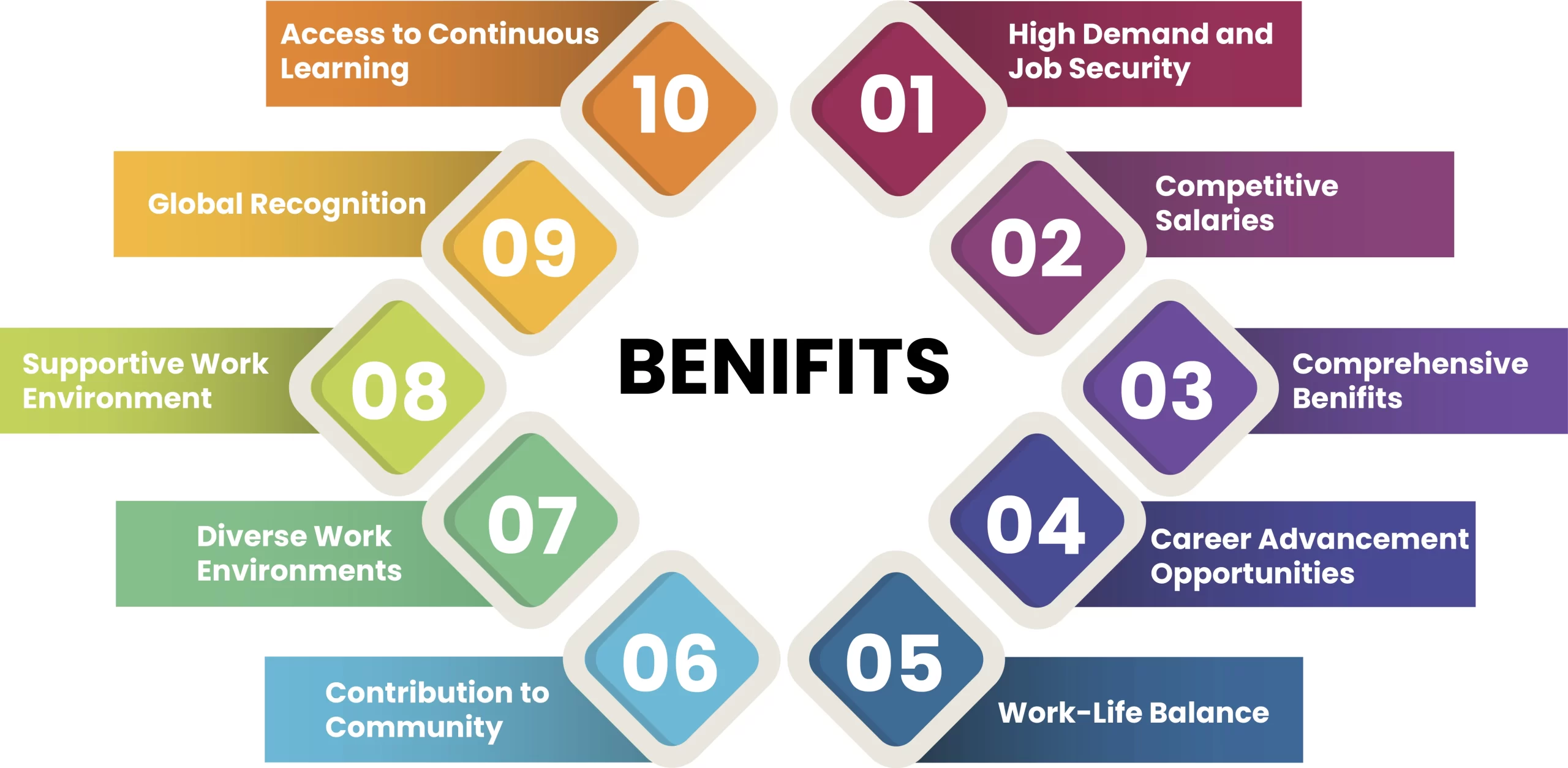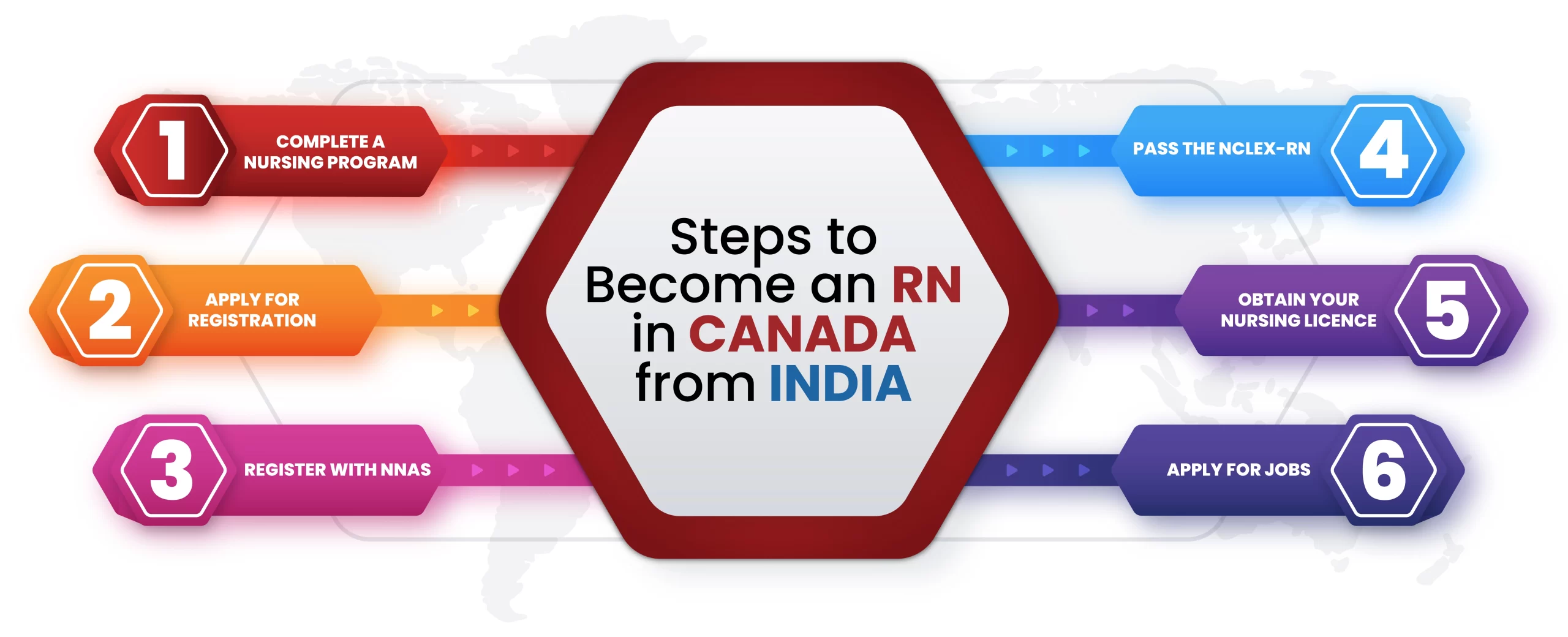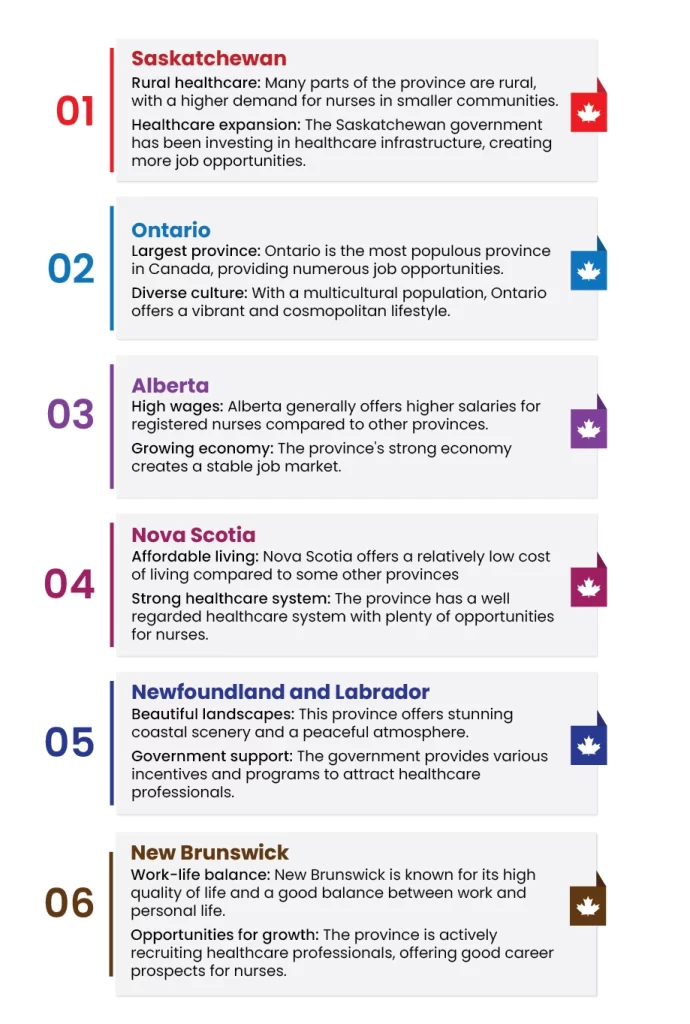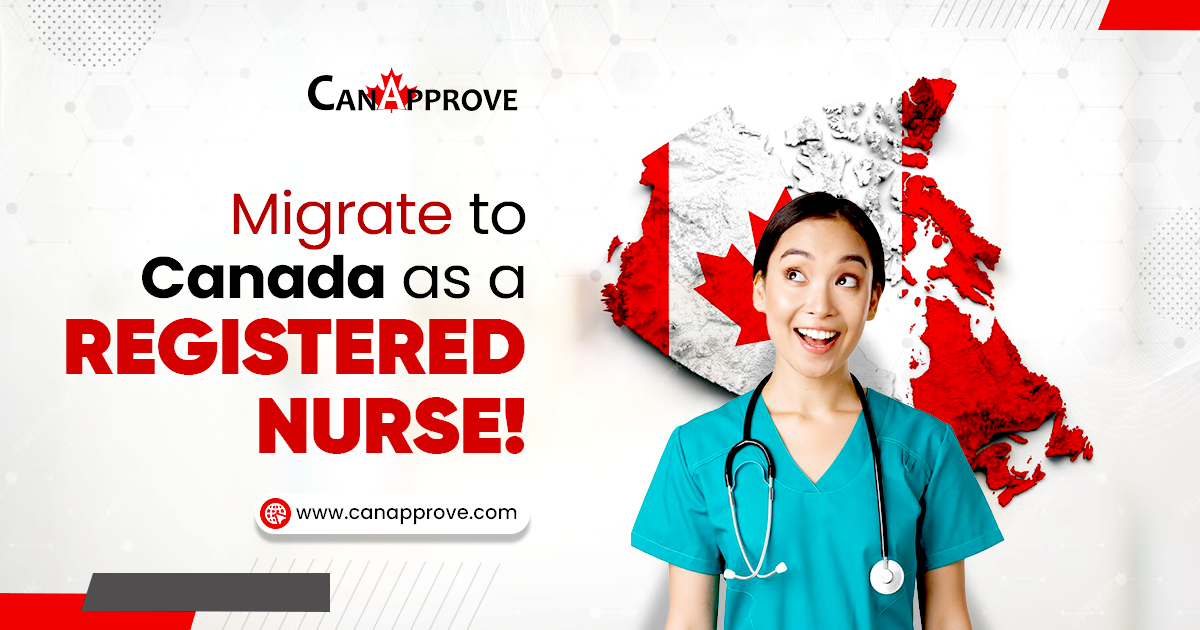The Registered Nurse in Canada serves as one of the cornerstones of the medical system and is often an initial point of interaction with clients. However, nursing is also one of the most notoriously competitive fields to get into it and which necessitates extraordinary hard work and dedication.
All the information you’ll need to know on how to become a registered nurse in Canada will be provided in this blog.
Let’s get going!
Table of Content
1An Overview of Registered Nurses in Canada2Duties and Responsibilities of a Registered Nurse in Canada3Benefits Of Becoming A Registered Nurse in Canada4Requirements to Work as a Registered Nurse in Canada5Age Limit for Nurses in Canada6Registered Nurse Jobs in Canada7Registered Nurse Salary in Canada8How to Migrate to Canada as a Registered Nurse9How to become a registered nurse in Canada from India10Best Province to Work as a Registered Nurse in Canada11Conclusion12Frequently Asked Questions
An Overview of Registered Nurses in Canada
Registered nurses and registered psychiatric nurses provide direct nursing care to patients, deliver health education programs and provide consultative services regarding issues relevant to the practice of nursing. They are employed in a variety of settings including hospitals, nursing homes, extended care facilities, rehabilitation centres, doctors’ offices, clinics, community agencies, companies, private homes and public and private organisations or they may be self-employed.
Duties and Responsibilities of a Registered Nurse in Canada
Here are some of the main Duties and Responsibilities of a Registered Nurse in Canada:
- Evaluate patients to determine specific nursing care that they need to be given.
- Carefully work as a health team with other members to organise, monitor, and evaluate the administration of patient care with consultations from the patient and or the family
- Give prescribed medicines or treatment procedures as directed by a doctor or as stated by the prescribed health facility’s guidelines.
- Some of the activities include; Observing, evaluating, intervening, recording and communicating signs and alterations in patients’ states.
- Maintain or control medical apparatus or equipment
- Help in operations and other procedures in the treatment of illnesses.
- May be designated to supervise licensed practical nurses as well as other nursing personnel.
- May develop with admissions of patients a formal system in the discharge planning process.
- Need to provide education or consult with patients or their families as well as other health care providers on health related issues.
Benefits of Becoming a Registered Nurse in Canada

The benefits of becoming a Registered Nurse in Canada are:
1. High Demand and Job Security
Canada at the moment has a rising demand for healthcare workers in general and this includes nurses. Due to this high demand, there is very good job security and many employment openings for Forensic Psychologists all over Canada.
2. Competitive Salaries
According to the Canadian Institute for Health Information, registered nurse salary in Canada can be competitive with opportunities to earn even more contingent upon experience, practice area, and region.
3. Comprehensive Benefits
Salaries of RNs in Canada also consist of benefits such as medical and dental, pension and group insurance, as well as paid vacation.
4. Career Advancement Opportunities
There are several approaches in the healthcare system in Canada if one is willing to advance in his/her career. Nurses can also progress to other specific areas, administrative positions or continue with their studies to become Nurse Practitioners or Nurse Educators.
5. Work-Life Balance
Most of the health care organisations in Canada provide the flexibility of working on the shift to create balance between work and personal life. These hours of operation are especially favourable for those with other responsibilities such as families.
6. Contribution to Community
A working RN in Canada has the responsibilities of enhancing the health of his or her community. Another advantage of the profession this is the feeling of having a purpose and the fulfilment that comes with it.
7. Diverse Work Environments
This flexibility means that Registered Nurses can find employment in different areas such as hospitals, clinics, community healthcare centres, schools, rural areas and many more making the work experience very challenging and interesting.
8. Supportive Work Environment
The Canadian culture values teamwork in healthcare, creating an appropriate and professional work climate for nurses.
9. Global Recognition
Canadian nursing credentials are recognized worldwide, allowing RNs to work in other countries with relative ease if they choose to do so.
10. Access to Continuous Learning
Canada encourages professionalism and career enhancement, where nurses have opportunities to receive updating courses and training throughout their career.
Requirements to Work as a Registered Nurse in Canada
Here are some key requirements you must consider before you can work as a Registered Nurse (RN) in Canada:
1. Education
You have to have passed a nursing education program, which has been recognized by the appropriate regulatory college in the province of practice.
2. Registration
First of all, each candidate who wants to work as a nurse must be registered with a regulatory body within the province or territory in which he/she intends to practise. Every province has a regulating body in nursing practice and registration of nurses required for the execution of practice.
3. Language Proficiency
You need to show that you meet the language requirement either in English or in French depending on the province you would like to practise in. It is critical for one to be fluent in the language in the course of serving the patients and while interacting with the staff.
4. Certification Exam
In this case one must write a national certification examination including the NCLEX-RN which is an examination of the nursing competency in Canada.
5. Work Visa (if applicable)
If you are an international student or any other person not having Canadian nationality or permanent resident then the employment of a nurse in Canada will require a proper work visa or permit in most cases.
6. Criminal Record Check
Most of the provincial jurisdictions have laid down a mandate that every applicant must produce a criminal record check or complete a background check to be sure that they possess the qualities that will make them practise safely.
There are basic requirements for a person to be a Registered Nurse in Canada and may vary according to the province or territory interested.
Click on the following links to explore the most updated information on the nursing regulatory boards for your preferred province or territory:
| Province/Territory | Nursing regulatory boards |
| Alberta | College of Registered Nurses of Alberta |
| British Columbia | British Columbia College of Nurses and Midwives |
| Manitoba | College of Registered Nurses of Manitoba |
| New Brunswick | Nurses Association of New Brunswick |
| Newfoundland & Labrador | College of Registered Nurses of Newfoundland and Labrador |
| Northwest Territories | College and Association of Nurses of the North West Territories and Nunavut |
| Nova Scotia | Nova Scotia College of Nursing |
| Ontario | College of Nurses of Ontario |
| Prince Edward Island | College of Registered Nurses of PEI |
| Quebec | Order of Nurses of Quebec |
| Saskatchewan | College of Registered Nurses of Saskatchewan |
| Yukon | Yukon Registered Nurses Association |
Age Limit for Nurses in Canada
There is no strict age limit for nurses who wants to migrate or work in Canada. But younger applicants generally earn more points in programs like Express Entry and Provincial Nominee Programs (PNPs), typically up to the age of 45.
Experienced nurses still have pathways available, such as employer-sponsored work permits or the Atlantic Immigration Program (AIP).
To work in Canada, nurses must fulfill specific requirements, including passing language tests, meeting educational standards, and obtaining licensure through the National Nursing Assessment Service (NNAS).
Registered Nurse Jobs in Canada
The Registered Nurse Jobs in Canada are:
1. Registered Nurse (RN)
2. Critical Care Nurse
3. Emergency Room Nurse
4. Pediatric Nurse
5. Operating Room Nurse
6. Oncology Nurse
7. Geriatric Nurse
8. Mental Health Nurse
9. Community Health Nurse
10. Home Care Nurse
The nursing profession is one of the most in demand jobs in Canada, offering strong career opportunities along with competitive salaries and benefits. Nurses can work in hospitals, clinics, community health centers, and long-term care facilities.
Registered Nurse Salary in Canada
Registered Nurse salary in Canada ranges from CAD 65,000 to 95,000 per year on average, depending on experience, location, and specialization.
Entry-level registered nurses typically earn around CAD 55,000 to 65,000 per year, while experienced nurses and specialized roles such as critical care nurses or nurse practitioners can earn over CAD 100,000 per year.
Let’s look at the average Registered Nurse salary by province and territory in Canada:
| Province/Territory | Median ($/hour) |
| Nunavut | 64.69 |
| Northwest Territories | 51.00 |
| Yukon Territory | 48.14 |
| British Columbia | 43.00 |
| Alberta | 46.62 |
| Saskatchewan | 46.00 |
| Manitoba | 42.00 |
| Ontario | 38.05 |
| Quebec | 38.50 |
| New Brunswick | 40.00 |
| Nova Scotia | 40.00 |
| Prince Edward Island | 40.00 |
| Newfoundland and Labrador | 41.24 |
Additional Compensation Factors
Overtime: Nurses can earn additional income through overtime, often at 1.5x to 2x their regular hourly rate.
Specialisations: Nurses with specialisations (e.g., ICU, ER, oncology) tend to earn higher salaries.
Pension Contributions: Many public sector employers contribute to a pension plan, which is a significant long-term benefit. Employer contributions can be 7-10% of the nurse’s salary.
Flexible Scheduling: Some employers offer flexible scheduling options, allowing nurses to balance work with personal commitments.
Paid Time Off: In addition to vacation days, nurses often receive paid sick leave, maternity/paternity leave, and personal days.
Salaries can also vary based on the type of employer (e.g., public hospitals, private clinics, long-term care facilities).
How to Migrate to Canada as a Registered Nurse
If you’re an RN looking to build a rewarding career in Canada, this will walk you through the essential steps to Immigrate to Canada as a Registered Nurse:
1. Check Eligibility: Make sure you meet the work experience, language proficiency, and education requirements.
2. Credential Assessment: Get your nursing credentials assessed by the National Nursing Assessment Service (NNAS).
3. Choose an Immigration Program: Apply through Express Entry, PNP, or Atlantic Immigration Program.
4. Secure a Job Offer: A job offer from a Canadian employer can strengthen your application.
5. Submit Application: Apply to IRCC with required documents (language tests, NNAS assessment, etc.).
6. Work Permit: Apply for a work permit if needed while awaiting PR.
7. Register with Provincial Body: Apply for registration with a provincial nursing body.
8. Pass NCLEX-RN: Complete the NCLEX-RN exam (depending on the province).
9. Receive PR: After meeting all requirements, obtain Canadian Permanent Residency.
How to become a Registered Nurse in Canada from India
Beginning a career in nursing in Canada from India is one of the most rewarding avenues to be part of a health care system in the world. Being a country with a great population and an ever expanding need for health care services, Canada opens the door for internationally educated nurses. 
Here’s a step-by-step guide to become a Registered Nurse in Canada from India:
Step 1: Complete a Nursing Program
Obtain a diploma, associate, or bachelor’s degree in nursing from a recognized educational institution.
Step 2: Apply for Registration
Register with the regulatory body in the province or territory where you plan to work, such as the College of Nurses.
Step 3: Register with NNAS
Sign up with the National Nursing Assessment Service (NNAS) to get an Advisory Report on your credentials. Also some provinces in Canada may have their own specific requirements or processes for Indian nurses, and an NNAS Advisory Report might not be mandatory in those cases..
Step 4: Pass the NCLEX-RN
After getting an Advisory Report on your credentials, pass the National Council Licensure Examination for Registered Nurses (NCLEX-RN) in most provinces.
Step 5: Obtain your Nursing Licence
Receive your licence to practise as a registered nurse upon passing the exam.
Step 6: Apply for Jobs
Look for nursing positions in hospitals, clinics, or long-term care facilities. Gaining work experience in Canada can enhance your employment prospects.
Follow the requirements set by the regulatory body in the province or territory where you wish to work. Becoming a Registered Nurse in Canada is a pathway to obtaining Canada PR.
Best Province to Work as a Registered Nurse in Canada
The best provinces to work as a Registered Nurse in Canada are Saskatchewan, Ontario, Alberta, Nova Scotia, Newfoundland & Labrador, and New Brunswick.
Before choosing a province to work as a registered nurse in Canada, consider several key factors. Start by researching job opportunities to understand where nurse demand is highest. Evaluate the cost of living, including housing and transportation, as this varies across provinces.
Finally, ensure you meet the specific licensing requirements for each province, as they may differ. Balancing these factors will help you choose the best province for your nursing career and lifestyle.
The image below provides detailed information about each province:

Conclusion
Are you considering advancing your nursing career in Canada? By comparing the best provinces for your goals, you make a wise step. Got Canada immigration questions? We are your expert Canada immigration consultants team, waiting for your click – let us make the process easier for you!
Frequently Asked Questions





